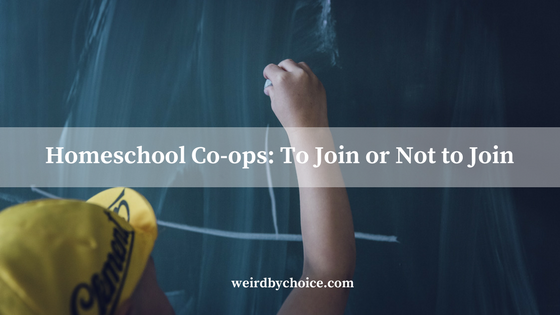If you’re considering homeschooling for the first time, you’re probably lying awake at night thinking about all the things that won’t get done around the house, obsessing over curriculum choices, and trying to decide which local co-op to join. [Note: If you’re currently in your fourth…sixth…tenth year of homeschooling, you’re probably doing the same.] Our primary homeschool quandaries may not have changed considerably over time, but choosing which co-op to join may be a relatively new addition to the homeschooling parents’ radar. In fact, I don’t think it was really on most parents’ radar 20 years ago. Today it seems almost a given, which got me thinking why do we join homeschool co-ops and why do we feel they are a necessary part of our children’s education?
WHAT IS A HOMESCHOOL CO-OP?
There are many different types of homeschool co-ops available. The three most common I encounter in my area are:
- Small groups of parents who regularly schedule time for their kids to get together to socialize and work on limited schoolwork together (science, art, or other subjects which can be challenging to complete at home)
- Larger community-based groups of homeschoolers who meet regularly to allow time for socializing, as well as structured enrichment activities such as crafts, arts, gym time, etc
- Private-school modeled co-ops which typically enjoy larger enrollments, a robust academic schedule, graded classes, etc. These co-ops often meet multiple times each week and send children home with homework assignments to complete outside of their co-op time.
WHY DO WE JOIN HOMESCHOOL CO-OPS?
I think the most common reason is the dreaded socialization issue, which we all outwardly roll our eyes at, and inwardly fear we aren’t doing enough of. Joining a co-op is an easy way to provide our children with a similarly-minded cohort with which to interact, and is certainly less emotionally taxing than scheduling an actual playdate. (Please tell me I’m not the only one who feels this way…)
We may enroll in a co-op as a way to expose our kids to certain subjects that we find difficult to teach. This could range from subjects for which we feel a lack of mastery like math or composition, or subjects that are simply messy and a lot of work to teach at home like lab-based sciences and art.
The third reason, I fear, may be just because everyone else seems to do it. “Oh you go to XYZ Co-op? I’ve been thinking about joining that one too!” (Not really. Never thought about it. Note to self: Google XYZ Co-op when I get home.) It doesn’t really matter if you pride yourself on being mainstream, or you consciously take the path more weirdo, none of us like the idea of being somehow left out.
These are all reasonable, or at least understandable points. But co-ops aren’t necessarily the right solution for your kids or your homeschool.
BUT DOESN’T THAT MEAN I…
Have to fit something else into my overloaded, never-completed homeschool schedule? Yeah, it does. Unlike other subjects which can be completed on your time and on your schedule, however haphazard and haggard it may be, co-ops meet on set days at set times, which means you’ll be adding something else to your to-do list.
Am handing over a piece of my child’s education to someone else? Most days we may question our ability to teach certain subjects or feel inadequate as our child comes to us with a seemingly unsolvable third-grade math problem, but at the root of our homeschooling choice is the idea that we feel like we are best suited to teach our own children. By giving that up to someone else, you are trusting that someone to understand your child and teach in a way that works for his/her learning style.
Am adding something else to my stretched homeschool budget? Most co-ops charge at least a small fee to cover the costs of materials, building rentals and other basic charges, which makes sense. Some co-ops, particularly the more institutionally modeled, can quickly rack up charges if you’re putting multiple children into multiple classes. In my experience, it’s not that the classes are a poor value; it’s just that they come with a hefty price tag that can sometimes be difficult to budget for.
Have to volunteer? Wait! What? Most co-ops require their participants to volunteer in some capacity. Some want parents to take turns teaching classes, other larger co-ops expect a wide range of volunteer duties from custodial to childcare to food service. At the large co-op my kids have attended in the past, there was a volunteer “buy out” option, but the price was set very high to obviously discourage people from taking this option. It’s not that I don’t understand why these processes are put into place, but something in my core balks at the idea at forced volunteerism. Wouldn’t it make more sense to reduce the fees of people who volunteer as an incentive, rather than punishing those who don’t? (Sorry. Deep breaths.)
THE BOTTOM LINE
Homeschool co-ops can be a positive addition to your homeschool experience. They provide an opportunity for your kids to interact with peers and can be a great way to cover subject matters that are difficult to thoroughly pursue at home. But, let’s not forget the beauty of homeschooling is that we control our own schedules, subject matters and methods of teaching. It’s important that we don’t succumb to cultural pressures (even within our homeschooling circles) and join a co-op, just because everyone else is, or because we worry we’re not doing enough. Our kids are learning each day. We aren’t ruining or undersocializing our kids. And we don’t need to do anything, just because others do.





